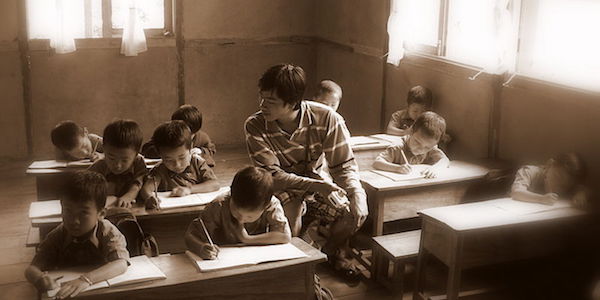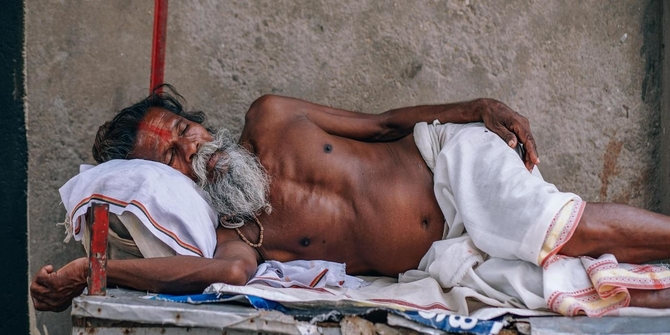 In spite of reservations in the higher education system and beyond, caste discrimination continues to persist. However, if steps are taken towards developing a formative system of education equally open to all, we can build the foundations of a more self-sufficient and empathetic citizenry in the future, writes Ananye Krishna.
In spite of reservations in the higher education system and beyond, caste discrimination continues to persist. However, if steps are taken towards developing a formative system of education equally open to all, we can build the foundations of a more self-sufficient and empathetic citizenry in the future, writes Ananye Krishna.
In India, the ruling parties regularly bring out schemes to ameliorate the masses and thus guarantee its vote bank stays intact for the future elections. The present government has also come up with number of such initiatives, including the Jan Dhan Yojana, the Ujjwala Yojana and Saubhagya Scheme but there is no panacea to address one of the most serious issues faced by this country – the poor quality of education.
Although over the past two decades, the enrolment of children in schools has increased substantially, the improvement in the quality of education has not experienced similar progress. Without proper elementary education, not only will people (primarily due to illiteracy) be unable to avail themselves of the benefits of the various schemes mentioned, but furthermore, they will not be able to unlock their own potential. Moreover, the government is not able to create a sufficient number of jobs to accommodate India’s growing youth, and the jobs which it is creating are paying too little to help a person lead a dignified life as an active member of the society. If proper education and vocational education is provided, it will better equip people to create jobs for themselves, although this also depends on the government to create an environment more conducive for individual enterprise.
Currently only a small proportion of the population is able to enjoy the “luxury” of quality education while the majority of underprivileged children while away their times inside buildings labelled as schools but where the quality of learning is much below the required standards. Furthermore, despite increasing attendance figures, many children don’t even go to school. It is thus high time that learning and attendance were differentiated from each other. Programmes such as the Mid-Day Meals Scheme might have helped in augmenting the amount of enrolment into schools but this has not been enough to educate the children. Since learning as such is not taking place most of these children continue to spend their lives in the fringes and hence do not have a voice in the society.
Reservation was introduced as an instrument to undo the wrongs of the caste system by aiming to ensure that everyone has an equal opportunity to rise up the social and economic ladder but this did not actually happen. The failure of reservation is because of various reasons, one of the important reasons seems to be that although people from the Scheduled Castes, Scheduled Tribes and the Other Backward Classes are able to get admitted into institutes of higher learning but caste discrimination persisting at the university level does not allow them to go further ahead. Another important handicap faced by the students coming from the reserved categories is that they lack the ability to fluidly communicate in English, which is caused primarily because of their poor elementary education, and thus restrains their performance since all the courses are usually offered in English.
If we really want to bring about some balance in society then it will not be enough that all the people have the equal opportunity to apply for various jobs and forms of higher education, it will also be important that there should be some semblance of equality of conditions and the government can do this to some extent by ensuring that all the students get an equally good level of education. There is a possibility that if we can create a system of elementary education which caters to all equally then in that situation we will be able to bridge the gap which unfortunately continues to persist between various caste groups in the country, this will ensure that all the children are subjected to the same formative conditions.

Boys studying in a classroom with their teacher in East Sikkim. Picture credit: Dhillan Chandramawli, Wikimedia commons, CC SA-BY 2.0.
It is true that variations at their homes and localities will continue to create a substantially affective difference between the children. In order to tackle this problem, it becomes important to design an educational program which requires the child to study only when in the classroom and does not burden him or her with tasks to be done at home. While with respect to the problem about the effect of the home environment on the performance of the child, it is something which cannot be controlled directly by the state but interventions at community level may help in ensuring that the child is not subjected to an unhealthy domestic environment.
Once such system of education is in place at the elementary level, we can expect fairer competition between children. If it really turns out to be effective, then it might even be possible to think about rolling back reservations in the years to come. Still, since this remains far off, a more achievable goal at present is to provide quality basic education, which can unlock access to further education opportunities, too. For instance, a working knowledge of English has the potential to allow a person access to a wealth of knowledge and vocations earlier closed to them. Dalit scholar, Kancha Ilaiah, says that English is the major barrier. Indeed it is true that English is a skill without which one loses out on a lot of opportunities. Also, it is important to understand that the importance of English transcends the English v. mother tongue debate, the reason being that English is no longer represents a colonial world but it rather represents a global opportunity.
Presently there are several organisations trying to level the playing field, like MAD (Make a Difference), Pratham, and concepts like library on wheels. All these programs are uplifting underprivileged students by providing them with good teachers, personal mentors and access to resources but what we need to do is to go ahead another step and develop a more cohesive system of education, which ensures that everyone starts off from the same level. Cohesive in the sense that children irrespective of background should be allowed to be a part of the same class and to be taught by the same teacher. Our teachers should be such that she or he could be capable to empathise with all the students and do what is the best for the education of each child. For this to happen it becomes of crucial importance that we train our teachers in the best way possible. Indeed, people like Anu Aga (philanthropist and former head of Thermax), have taken steps in this direction via projects like Pune City Connect, which are working towards proper training of teachers in order to ensure improved quality of education in schools. If the government is unable to create a quality pool of teachers then perhaps we should also look to philanthropists and the income generated from CSR to fund such projects for the benefit of society as a whole.
Whilst we may not be able to create a veil of ignorance scenario under which all are equal, if we are able to construct a system of education which helps each child to learn equally and allows children from different classes to learn together, then it is possible it will entrench a deeper sense of empathy and responsibility in the minds of the children. The responsibility to ensure that no policy decision or any other action as such is taken or done in an inequitable manner. Thus not only will each child be educated on a par with their peers, but there will also be an assurance that the present attitude of oppression on the basis of caste is also completely uprooted. So, if steps are taken towards developing such a system of education which is open to all, we can build the foundations of a more self-sufficient and empathetic citizenry in the future.
This article gives the views of the authors, and not the position of the South Asia @ LSE blog, nor of the London School of Economics. Please read our comments policy before posting.
About the Author
 Ananye Krishna is a fourth year student at NALSAR University of Law, Hyderabad. He has been engaged in teaching underprivileged children for the past year and believes that proper education is necessary for a healthy and inclusive life.
Ananye Krishna is a fourth year student at NALSAR University of Law, Hyderabad. He has been engaged in teaching underprivileged children for the past year and believes that proper education is necessary for a healthy and inclusive life.








Excellent .